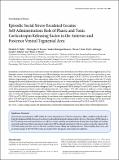Episodic Social Stress-Escalated Cocaine Self-Administration: Role of Phasic and Tonic Corticotropin Releasing Factor in the Anterior and Posterior Ventral Tegmental Area
Author(s)
Boyson, C. O.; Montagud-Romero, S.; Stein, D. J.; Gobrogge, K. L.; DeBold, J. F.; Miczek, K. A.; Holly, Elizabeth N; ... Show more Show less
DownloadHolly-2016-Episodic Social Stre.pdf (2.930Mb)
PUBLISHER_CC
Publisher with Creative Commons License
Creative Commons Attribution
Terms of use
Metadata
Show full item recordAbstract
Intermittent social defeat stress escalates later cocaine self-administration. Reward and stress both activate ventral tegmental area (VTA) dopamine neurons, increasing downstream extracellular dopamine concentration in the medial prefrontal cortex and nucleus accumbens. The stress neuropeptide corticotropin releasing factor (CRF) and its receptors (CRF-R1, CRF-R2) are located in the VTA and influence dopaminergic activity. These experiments explore how CRF release and the activation of its receptors within the VTA both during and after stress influence later cocaine self-administration in rats. In vivo microdialysis of CRF in the VTA demonstrated that CRF is phasically released in the posterior VTA (pVTA) during acute defeat, but, with repeated defeat, CRF is recruited into the anterior VTA (aVTA) and CRF tone is increased in both subregions. Intra-VTA antagonism of CRF-R1 in the pVTA and CRF-R2 in the aVTA during each social defeat prevented escalated cocaine self-administration in a 24 h “binge.” VTA CRF continues to influence cocaine seeking in stressed animals long after social defeat exposure. Unlike nonstressed controls, previously stressed rats show significant cocaine seeking after 15 d of forced abstinence. Previously stressed rats continue to express elevated CRF tone within the VTA and antagonism of pVTA CRF-R1 or aVTA CRF-R2 reverses cocaine seeking. In conclusion, these experiments demonstrate neuroadaptive changes in tonic and phasic CRF with repeated stress, that CRF release during stress may contribute to later escalated cocaine taking, and that persistently elevated CRF tone in the VTA may drive later cocaine seeking through increased activation of pVTA CRF-R1 and aVTA CRF-R2.
Date issued
2016-04Department
Massachusetts Institute of Technology. Department of Brain and Cognitive Sciences; McGovern Institute for Brain Research at MITJournal
Journal of Neuroscience
Citation
Holly, E. N., C. O. Boyson, S. Montagud-Romero, D. J. Stein, K. L. Gobrogge, J. F. DeBold, and K. A. Miczek. “Episodic Social Stress-Escalated Cocaine Self-Administration: Role of Phasic and Tonic Corticotropin Releasing Factor in the Anterior and Posterior Ventral Tegmental Area.” Journal of Neuroscience 36, no. 14 (April 6, 2016): 4093–4105. © 2017 by the Society for Neuroscience
Version: Final published version
ISSN
0270-6474
1529-2401